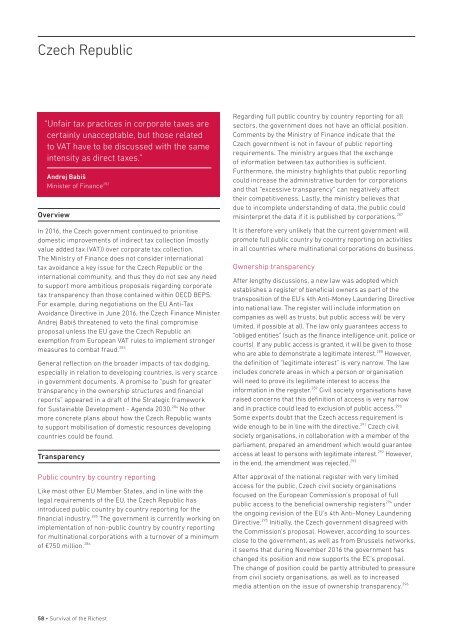You also want an ePaper? Increase the reach of your titles
YUMPU automatically turns print PDFs into web optimized ePapers that Google loves.
Czech Republic<br />
“Unfair tax practices in corporate taxes are<br />
certainly unacceptable, but those related<br />
to VAT have to be discussed with <strong>the</strong> same<br />
intensity as direct taxes.”<br />
Andrej Babiš<br />
Minister <strong>of</strong> Finance 282<br />
Overview<br />
In 2016, <strong>the</strong> Czech government continued to prioritise<br />
domestic improvements <strong>of</strong> indirect tax collection (mostly<br />
value added tax (VAT)) over corporate tax collection.<br />
The Ministry <strong>of</strong> Finance does not consider international<br />
tax avoidance a key issue for <strong>the</strong> Czech Republic or <strong>the</strong><br />
international community, and thus <strong>the</strong>y do not see any need<br />
to support more ambitious proposals regarding corporate<br />
tax transparency than those contained within OECD BEPS.<br />
For example, during negotiations on <strong>the</strong> EU Anti-Tax<br />
Avoidance Directive in June 2016, <strong>the</strong> Czech Finance Minister<br />
Andrej Babiš threatened to veto <strong>the</strong> final compromise<br />
proposal unless <strong>the</strong> EU gave <strong>the</strong> Czech Republic an<br />
exemption from European VAT rules to implement stronger<br />
measures to combat fraud. 283<br />
General reflection on <strong>the</strong> broader impacts <strong>of</strong> tax dodging,<br />
especially in relation to developing countries, is very scarce<br />
in government documents. A promise to “push for greater<br />
transparency in <strong>the</strong> ownership structures and financial<br />
reports” appeared in a draft <strong>of</strong> <strong>the</strong> Strategic framework<br />
for Sustainable Development - Agenda 2030. 284 No o<strong>the</strong>r<br />
more concrete plans about how <strong>the</strong> Czech Republic wants<br />
to support mobilisation <strong>of</strong> domestic resources developing<br />
countries could be found.<br />
Transparency<br />
Public country by country reporting<br />
Like most o<strong>the</strong>r EU Member States, and in line with <strong>the</strong><br />
legal requirements <strong>of</strong> <strong>the</strong> EU, <strong>the</strong> Czech Republic has<br />
introduced public country by country reporting for <strong>the</strong><br />
financial industry. 285 The government is currently working on<br />
implementation <strong>of</strong> non-public country by country reporting<br />
for multinational corporations with a turnover <strong>of</strong> a minimum<br />
<strong>of</strong> €750 million. 286<br />
Regarding full public country by country reporting for all<br />
sectors, <strong>the</strong> government does not have an <strong>of</strong>ficial position.<br />
Comments by <strong>the</strong> Ministry <strong>of</strong> Finance indicate that <strong>the</strong><br />
Czech government is not in favour <strong>of</strong> public reporting<br />
requirements. The ministry argues that <strong>the</strong> exchange<br />
<strong>of</strong> information between tax authorities is sufficient.<br />
Fur<strong>the</strong>rmore, <strong>the</strong> ministry highlights that public reporting<br />
could increase <strong>the</strong> administrative burden for corporations<br />
and that “excessive transparency” can negatively affect<br />
<strong>the</strong>ir competitiveness. Lastly, <strong>the</strong> ministry believes that<br />
due to incomplete understanding <strong>of</strong> data, <strong>the</strong> public could<br />
misinterpret <strong>the</strong> data if it is published by corporations. 287<br />
It is <strong>the</strong>refore very unlikely that <strong>the</strong> current government will<br />
promote full public country by country reporting on activities<br />
in all countries where multinational corporations do business.<br />
Ownership transparency<br />
After lengthy discussions, a new law was adopted which<br />
establishes a register <strong>of</strong> beneficial owners as part <strong>of</strong> <strong>the</strong><br />
transposition <strong>of</strong> <strong>the</strong> EU’s 4th Anti-Money Laundering Directive<br />
into national law. The register will include information on<br />
companies as well as trusts, but public access will be very<br />
limited, if possible at all. The law only guarantees access to<br />
“obliged entities” (such as <strong>the</strong> finance intelligence unit, police or<br />
courts). If any public access is granted, it will be given to those<br />
who are able to demonstrate a legitimate interest. 288 However,<br />
<strong>the</strong> definition <strong>of</strong> “legitimate interest” is very narrow. The law<br />
includes concrete areas in which a person or organisation<br />
will need to prove its legitimate interest to access <strong>the</strong><br />
information in <strong>the</strong> register. 289 Civil society organisations have<br />
raised concerns that this definition <strong>of</strong> access is very narrow<br />
and in practice could lead to exclusion <strong>of</strong> public access. 290<br />
Some experts doubt that <strong>the</strong> Czech access requirement is<br />
wide enough to be in line with <strong>the</strong> directive. 291 Czech civil<br />
society organisations, in collaboration with a member <strong>of</strong> <strong>the</strong><br />
parliament, prepared an amendment which would guarantee<br />
access at least to persons with legitimate interest. 292 However,<br />
in <strong>the</strong> end, <strong>the</strong> amendment was rejected. 293<br />
After approval <strong>of</strong> <strong>the</strong> national register with very limited<br />
access for <strong>the</strong> public, Czech civil society organisations<br />
focused on <strong>the</strong> European Commission’s proposal <strong>of</strong> full<br />
public access to <strong>the</strong> beneficial ownership registers 294 under<br />
<strong>the</strong> ongoing revision <strong>of</strong> <strong>the</strong> EU's 4th Anti-Money Laundering<br />
Directive. 295 Initially, <strong>the</strong> Czech government disagreed with<br />
<strong>the</strong> Commission's proposal. However, according to sources<br />
close to <strong>the</strong> government, as well as from Brussels networks,<br />
it seems that during November 2016 <strong>the</strong> government has<br />
changed its position and now supports <strong>the</strong> EC's proposal.<br />
The change <strong>of</strong> position could be partly attributed to pressure<br />
from civil society organisations, as well as to increased<br />
media attention on <strong>the</strong> issue <strong>of</strong> ownership transparency. 296<br />
58 • <strong>Survival</strong> <strong>of</strong> <strong>the</strong> <strong>Richest</strong>


